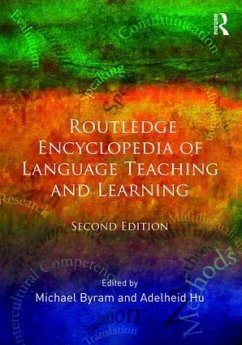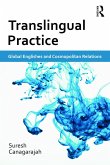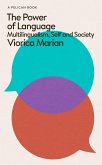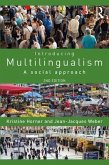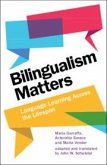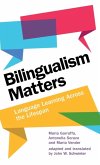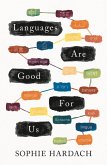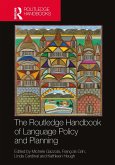The Routledge Encyclopedia of Language Teaching and Learning is an authoritative reference dealing with all aspects of this increasingly important field of study. Offering a comprehensive range of articles on contemporary language teaching and its history, it has been produced specifically for language teaching professionals and as a reference work for academic studies at postgraduate level.
In this new edition, every single entry has been reviewed and updated with reference to new developments and publications. Coverage has been expanded to reflect new technological, global and academic developments, with particular attention to areas such as online and distance learning, teacher and learner cognition, testing, assessment and evaluation, global English and teacher education.
Themes and disciplines covered include:
Methods and materials, including new technologies and materials development
Contexts and concepts, such as mediation, risk-taking in language learning and intercomprehension
Influential figures from the early days of language teaching to the contemporary
Related disciplines, such as psychology, anthropology and corpus linguistics
It covers the teaching of specific languages, including Japanese, Chinese, Arabic and African languages, as well as English, French, German and Spanish.
There are thirty five overview articles dealing with issues such as communicative language teaching, early language learning, teacher education and syllabus and curriculum design. A further 160 entries focus on topics such as bilingualism, language laboratories and study abroad. Numerous shorter items examine language and cultural institutions, professional associations and acronyms. Multiple cross-references enable the user to browse from one entry to another, and there are suggestions for further reading.
Written by an international team of specialists, the Routledge Encyclopedia of Language Teaching and Learning is an invaluable resource and reference manual for anyone with a professional or academic interest in the subject.
In this new edition, every single entry has been reviewed and updated with reference to new developments and publications. Coverage has been expanded to reflect new technological, global and academic developments, with particular attention to areas such as online and distance learning, teacher and learner cognition, testing, assessment and evaluation, global English and teacher education.
Themes and disciplines covered include:
Methods and materials, including new technologies and materials development
Contexts and concepts, such as mediation, risk-taking in language learning and intercomprehension
Influential figures from the early days of language teaching to the contemporary
Related disciplines, such as psychology, anthropology and corpus linguistics
It covers the teaching of specific languages, including Japanese, Chinese, Arabic and African languages, as well as English, French, German and Spanish.
There are thirty five overview articles dealing with issues such as communicative language teaching, early language learning, teacher education and syllabus and curriculum design. A further 160 entries focus on topics such as bilingualism, language laboratories and study abroad. Numerous shorter items examine language and cultural institutions, professional associations and acronyms. Multiple cross-references enable the user to browse from one entry to another, and there are suggestions for further reading.
Written by an international team of specialists, the Routledge Encyclopedia of Language Teaching and Learning is an invaluable resource and reference manual for anyone with a professional or academic interest in the subject.
Recommended by Choice, June 2013.
Praise for the second edition
"This second edition offers an authoritative up-to-date view of global and multidisciplinary perspectives in language teaching and learning. The editors have met the mammoth challenge of bringing together a wide range of top-flight scholarship into a single comprehensive volume. The result is an indispensible guide for students, teachers and scholars worldwide. Bravo!" Sandra J. Savignon, Pennsylvania State University, USA
"It is exciting to see a new edition of the well-regarded and useful Routledge Encyclopedia of Language Teaching and Learning. The second edition features updated entries, new topics, and several editorial enhancements that make this already-helpful single-volume encyclopedia even easier to use. Covering a wide range of historical, geographical, conceptual, and empirical ground related to language teaching and learning worldwide, the entries are just the right length-short enough to be accessible in a busy world, yet long enough to provide a sufficient scholarly overview of the relevant topic. The references and suggested reading that accompany the near-200 entries, as well as the cross-listing of topics within the volume, all provide immediate places for the reader to go for further study. For audiences that range from students to classroom teachers to researchers, from novices in the field to those with extensive experience, and from those who want a quick overview of an unfamiliar term or concept to those who wish to spend time exploring the numerous interconnections among topics within the volume, the second edition of the Routledge Encyclopedia of Language Teaching and Learning will prove to be a valuable asset." George C. Bunch, University of California, Santa Cruz, USA
"The Routledge Encyclopedia of Language Teaching and Learning is a 'must-have' for anyone with an interest in this area. Whilst the first edition was very good, the second is even better. Once picked up, it is extremely difficult to put down. The coverage is comprehensive. The structure is user-friendly. The writing is accessible. The references and suggestions for further reading have been brought right up to date. This new edition should feature on the book shelves of every undergraduate, postgraduate, teacher and University lecturer. The support it offers is first class and serves as a very helpful launch-pad into almost any language-related topic." Gary Chambers, University of Leeds, UK
Praise for the first edition
"This encyclopedia is valuable for many different purposes. Most of its entries read easily which is a definite plus for this kind of book. It is a rich source of knowledge and reference material for professionals within language teaching ... I would not hesitate to use some entries as background texts for a graduate course in second language acquisition. But most entries in this encyclopedia do not need to be taught: they will draw the interested reader in on their own merits." Sigrid Dentler

